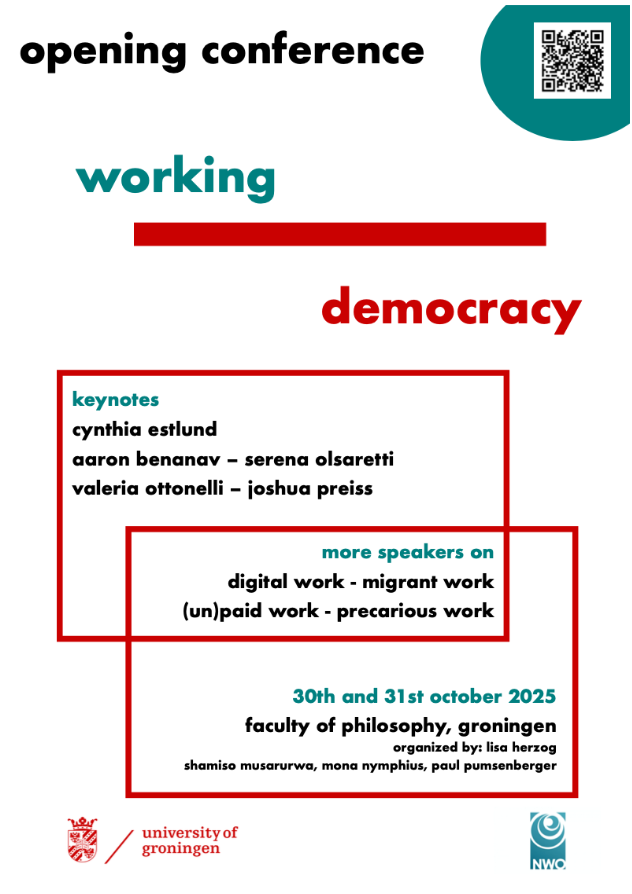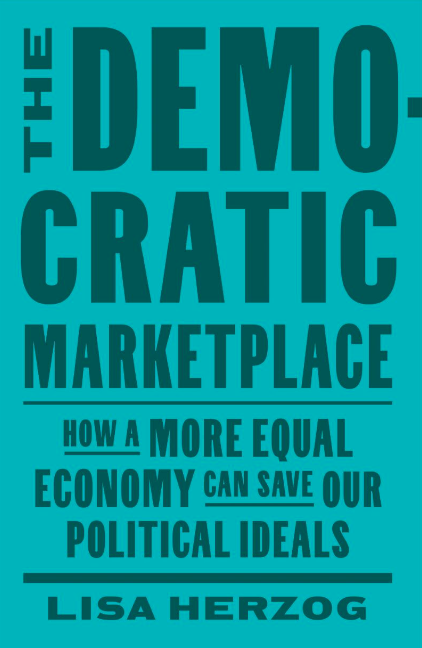#DW #11 NEWSLETTER
JUNE - SEPTEMBER 2025
“Democratize Work” to Be Released in German: Book Launch!
Dear signatories of the #DemocratizingWork Manifesto,
Amid the struggles of our times, members of the #DemocratizingWork Core Group have worked hard providing expertise to the Spanish Government on how to forge a path forward for democratizing work. The Report is expected to be out in the coming weeks! As workers worldwide continue their struggle to have a meaningful say in shaping their future, our future!, we are witnessing the increasingly urgent relevance of the Democratizing Work principles. These principles are not merely theoretical; they are a vital framework for building a future that is both democratic and sustainable for all. Democratizing, Decommodifying, and Decarbonizing Work resonate across debates, publications, and events worldwide. This gives us hope for a better tomorrow. Here are some of the key updates from our network. Please share yours via this input form.
We start this new academic year with an exciting piece of news: our joint volume will be released in German next month. We can’t wait to see how it will contribute to pushing forward the dynamics of democratizing work in Germany and Austria in particular, which have traditionally been at the forefront of democracy at work. Yet, the challenge of democratizing, decommodifying, and decarbonizing work remains pressing in these countries too, and this book is one step toward that horizon.
Join the online book launch!
Online, October 9 2025, 16.00–17.30 (Berlin/CET) - Digitale Buchvorstellung: Ferreras I., Battilana J., Méda D. ed., Die Demokratisierung der Arbeit. Ein Plädoyer zur Reorganisation unserer Wirtschaft (Bielefeld: Transcript)
German spoken
The German edition will be presented by Julia Hofmann (Arbeiterkammer Wien), Christoph Meister (Ver.di), Lisa Herzog (Universität Groningen, #DW Core Group member), with moderation by Markus Pausch (FH Salzburg, Demokratie & Dialog)
Was passiert, wenn sich der Kapitalismus zunehmend der Demokratie entzieht? Die Beiträger*innen plädieren für mehr Demokratie am Arbeitsplatz, um das Gleichgewicht zwischen Wirtschaft und Gesellschaft wiederherzustellen. Aus sozialwissenschaftlicher Perspektive analysieren sie die Erfahrungen der heutigen Arbeitswelt, erklären die Ursachen der Krise und entwerfen Vorschläge für eine Reform und demokratische Erneuerung der ökonomischen Sphäre. So werden interdisziplinäre Ansatzpunkte für die Transformation zu einer nachhaltigen Wirtschaft sichtbar, die den demokratischen Prinzipien unserer Gesellschaft entspricht. Anmeldung für die digitale Buchpräsentation: hier.
CALL FOR PAPERS
Leeds, April 2026, ILPC - Special Stream: Sustainability and Labour Organisations
At the International Labour Process Conference (ILPC) that will take place on 22-24 April 2026, a special stream will focus on how the triple transition—green, digital, and sociodemographic—reshapes work and labour organisations. While these transformations open new opportunities, they also bring risks of job loss, insecurity, skills mismatches, and inequality.
Convened by coordinators of the #DW Italian National Chapter among others, Paolo Borghi (Univ. of Pavia), Guido Cavalca (Univ. of Salerno), Licia Cianetti (Univ. of Birmingham), Francesca Gabbriellini (Fondazione Giangiacomo Feltrinelli), Marco Marrone (Univ. of Salento), Enzo Mingione (Univ. Milano Bicocca), and Costantino Romeo (École Polytechnique, Paris), the stream invites scholars and activists to reflect on the role of trade unions, grassroots movements, and digital activism in steering a just transition—mediating its impacts, promoting redistribution, and strengthening democracy at work. Please consider submitting your work to this call!
Abstracts should be submitted via the ILPC website by 31 October 2025. Please share your abstracts!
PAST EVENTS
Brussels, June 26, Towards a Green, Just and Competitive Future? Governing the Labour and Climate Transitions through Democratization
Different fields across the scientific literature increasingly indicate that workers’ participation is a key condition to accelerate the ecological transition at firm-level. Case studies conducted within Belgian ‘Best-in-class’ companies reveal the crucial role played by workers’ participation in decision-making inside companies for both developing and solidifying ecological transition pathways. The Policy Brief “Empowering Workers to Accelerate the Ecological Transition: Findings and Challenges from Belgian ‘Best-in-Class’ Companies,” by Isabelle Ferreras and Sebastian Perez Sepulveda (UCLouvain) was discussed at the Lamartra Belspo conference and is available online.
Athens, July 3-5, EGOS 2025 Colloquium - The Gendered Impact of Job Insecurity on Entrepreneurship
Imge Kaya-Sabanci (IE Business School, Madrid, #DW core group member) presented her research on the gendered impact of job insecurity on the transition from wage employment to entrepreneurship at the European Group for Organizational Studies (EGOS) 2025 Colloquium in Athens. Using Spanish-linked employer-employee data and the 2012 labor market reform as an exogenous shock, her study shows that faced with increased job insecurity, more people tend to start their own business — but significantly more so for men, thereby widening the gender gap. This research highlights the unintended gendered consequences of labor market reforms that reinforce disparities, in this case: in entrepreneurial activity.
UPCOMING EVENTS
Forthcoming Events and Conferences
Groningen, October 30–31 - Work and Democracy 2-day conference
How should democracies understand and organize work? On October 30–31, the Working Democracy Project team is hosting a major conference in Groningen. This gathering brings together leading philosophers and scholars—including Cynthia Estlund (New York University School of Law), Aaron Benanav (Cornell University), Joshua Preiss (University of North Carolina at Chapel Hill), Valeria Ottonelli (University of Genova), and Serena Olsaretti (ICREA-Universitat Pompeu Fabra Barcelona) to debate what democratic values such as equal respect and fair treatment require in times of profound labor transformation. Particular focus will be given to digital work, precarious work, and migrant work, alongside the persistent question of how to value unpaid care. The event is open to participants, free of charge (registration required before October 15). You can access the full program and abstracts here.
London, September 20 - Hélène Landemore at the How the Light Gets In Philosophy Festival
On September 20, Hélène Landemore (Yale University, #DW Core Group member) will be joining the How the Light Gets In philosophy festival in London to debate Curtis Yarvin, the philosopher influencing J.D. Vance’s politics. They will discuss democratic and authoritarian economics. Click here for more information.
NEW BOOKS
The Democratic Marketplace: How a More Equal Economy Can Save Our Political Ideals (Cambridge MA, Harvard University Press, 2025) Lisa Herzog
Our Core Group member, Lisa Herzog, has recently published a book, The Democratic Marketplace: How a More Equal Economy Can Save Our Political Ideals (Harvard University Press, 2025). In her book, she makes the case that capitalism has hollowed out democracy by reducing it to consumer-style voting and prioritizing profit, efficiency, and growth over self-governance. She argues that democracy can be revived only if its values are embedded in daily life, including through a reimagining of markets and their goals. You can find the book here.
PRE ORDER
Démocratie(s) en action, 50 approches renouvelées de l’entreprise et du travail, (Bordeaux, Editions Bord de l’Eau, 2025) Corentin Gombert, Eline Vivet-Maladry, Fadi Joseph Lahiani (ed.)
Un projet collectif, politique et poétique, pour faire respirer la démocratie au cœur des organisations. Et si la démocratie s’invitait au travail ? Face aux urgences sociales, écologiques et démocratiques, une idée simple mais puissante refait surface : et si l’entreprise devenait un véritable espace d’expérimentation démocratique ? Démocratie(s) en action explore cette ambition à travers une pluralité de regards et de voix. Issu des travaux de l’Agora D.O.D.E.S., ce livre réunit 67 auteurs et autrices venus d’horizons multiples — chercheur·ses, ouvrier·es, dirigeant·es, syndicalistes, consultant·es — qui ont uni leurs voix pour écrire 50 chapitres. Chacun partage une nuance, une expérience, une méthode ou une utopie concrète autour de la démocratisation du travail. Pour pré-commander l’ouvrage, cliquez ici.
NATIONAL CHAPTERS
France
Paris, September 22-24, ESS France Political Kick-off “Faire du bien plutôt que du chiffre : l'ESS trace la voie”
ESS France launched its political season with a strong message: in the face of profit-driven models, it is time to invest in the social and solidarity economy to protect the most vulnerable and address major social and ecological challenges. In fields such as early childhood, elderly care, and social reuse, social and solidarity economy has historically ensured quality services, defended human rights, fought inequalities, and offered dignified work. Yet, these essential actors are increasingly under pressure, competing with private models driven solely by financial returns. For more information see here.
Paris, September 23 - Onde de Coop: Is the Business Firm Political?
The 5th edition of #OndeDeCoop will gather participants at the Académie du Climat in Paris to debate a crucial question: Is the business firm political? The answer is of course yes — but the real issue lies in understanding how companies act as political actors, who take part in decision-making, and under which regimes. For more information, see here.
Italy
Turin, September 16–18 - ESPANET Italia 2025: Troubles in Transitions. Impact on Work, Workers’ Organisation and Territories
Democratizing Work Italia proposed, coordinated, and participated in a panel titled Troubles in transitions. Impact on work, workers’ organisation and territories. It explored how the triple transition - ecological, digital, and sociodemographic - reshapes work, workers’ organizations, and territories, raising both opportunities and risks. See more here.
Macerata, October 14-17 - Macerata Humanities Festival 2025
This event is co-organized by members of the Italian National chapters, Alberto Zanutto (Univ. di Macerata) and Paolo Ramazzotti (Univ. di Macerata).Paolo Borghi (Univ. of Pavia), Francesca Gabbriellini (Fondazione Giangiacomo Feltrinelli) and Guido Cavalca (Univ. Salerno), all members of Democratizing Work Italia will discuss the topics covered in the e-book Work, Cities, Fair Ecological Transition. Democratising and Decommodifying from the Global to the Local by DW Italia. The e-book, in Italian, can be downloaded for free here and information about the Macerata Humanities Festival is available here.
PUBLICATIONS
August, Alternatives Économiques - Isabelle Ferreras on “Démocratiser l’entreprise: le pari de l’Espagne”
Isabelle Ferreras (FNRS/University of Louvain-Harvard CLJE, #DW Core Group member) gives insights from the work undertaken by the expert committee on Democracy at Work established by the Ministry of Labor of Spain to provide a roadmap to fulfil article 129 (2) of the Spanish Constitution and implement democracy at work. To read the article, click here. The Report is expected to be released in October!
September, The Conversation - Dominique Méda on “De l’urgence de démocratiser l’entreprise”
Dominique Méda (University of Paris Dauphine PLS, #DW Core Group member) traces the long history of efforts to associate workers with ownership and decision-making. Despite moments of reform, shareholder primacy has prevailed, leaving workers politically sovereign but economically subordinated. Democratizing work, through true bicameral governance—giving workers and capital providers equal voice—can align companies with democracy, justice, and ecological sustainability. To read the article, click here.
MEDIA AND RESEARCH RESOURCES
New Gallup Poll – Employees and AI
A recent Gallup survey highlights that employees worldwide want more say in how new technologies, especially AI, are deployed in their workplaces. While many express dissatisfaction with top-down implementation, the data shows strong support for participatory approaches that align technological change with workers’ interests and well-being. To know more, click here.
Remember that this information-sharing tool is yours: a tool meant to disseminate recent research results, debates, and actual progress within and around our global network with Democratizing, Decommodifying, and Decarbonizing Work. Please share updates from your end. You can share your end of the news about #DemocratizingWork through filling out our form available here and via our website dedicated page.
Onward and upward,
The #DemocratizingWork Core Group,
Julie Battilana, Harvard University, Isabelle Ferreras, FNRS/University of Louvain-Harvard CLJE, Dominique Méda, University of Paris Dauphine PLS,
With Alyssa Battistoni, Barnard College, Julia Cagé, Sciences Po-Paris, Neera Chandhoke, University of Delhi, Lisa Herzog, University of Groningen, Imge Kaya-Sabanci, IE Business School, Madrid, Sara Lafuente Hernandez, University of Brussels-ETUI, Hélène Landemore, Yale University, Flavia Maximo, Universidade Federal de Ouro Preto, Brazil, Pavlina R. Tcherneva, Bard College-Levy Economics Institute







